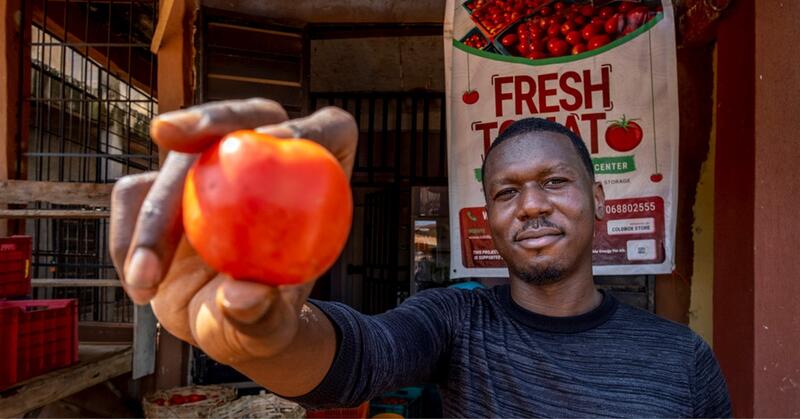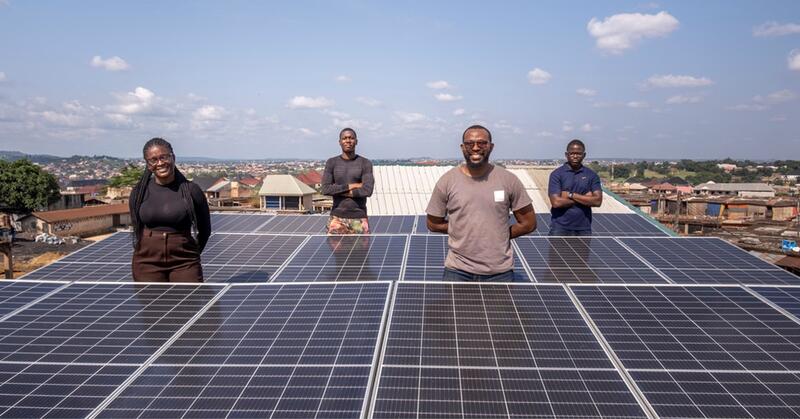Elsevier and ISES announce Coldbox Store as this year’s Renewable Transformation Challenge prize winner
The Nigerian solar-powered system aims to reduce food waste and its climate footprint by reducing post-food harvest losses.
Renewable Transformation Challenge recognizes and honors outstanding work encouraging progress towards a world powered by renewable energy and with accessible energy for all.
London, November 30, 2021 – Elsevier, a global leader in research publishing and information analytics, and the International Solar Energy Society (ISES), are pleased to announce Coldbox Store as the winner of the 2021 Renewable Transformation Challenge (RTC).
Food waste is a significant driver in climate change, as 6% of all global greenhouse emissions come from the production of food that is never eaten1. This creates a vicious cycle of more extreme climate, which makes food production more difficult and exacerbates poverty, malnutrition and inequality across society.
This year’s winner, Coldbox Store offers one solution that can help address this problem. By connecting perishable food farmers to markets and handle the cold chain logistics to ensure fresh produce is received at the expected quality, because 50% of the fruits and vegetables produced in Nigeria are never consumed due to post-harvest losses, and suffer from poor storage conditions, reducing what farmers can charge for their products.
“Coldbox Store is a walk-in, commercial, refrigeration solution that can store up to 15 tons of fruits and vegetables at a time,” said this year’s winner Uzochukwu Mbamalu on behalf of the Coldbox Store Team. “This can increase the shelf life of fresh produce, such as tomatoes, from 2 days to 21 days. It is an efficient refrigeration system that uses solar power for precooling and cold storage. The system is designed to be completely off-grid as Solar PV powers the entire solution.
“We have what it takes to bring about change - all we have to do is take action,” Mr. Mbamalu added.
Launched in 2017, the RTC aims to honor and showcase outstanding work that actively supports the transformation to a world powered by renewable energy and showcasing the potential to widen access to energy—particularly in low- and middle-income countries. The Challenge is open to individuals and organizations in both not-for-profit and commercial sectors worldwide. Over 85 entries were received this year, and were scored in terms of applicability, impact, sustainability and scalability in two stages: first by the Juror Panel; and then by the Elsevier-ISES Awards Committee who selected the final winner from the ten shortlisted candidates.
Klaus Vajen, President of ISES, said “Since the launch of the RTC in 2017, we have seen hundreds of applications from around the world, the best of which reflect incredible work being done by organizations, businesses and research institutions to address some of the most pressing challenges of our time. The RTC aims to highlight the many programs that help move the world toward an energy system supplied entirely by renewable energy sources and provide access to reliable renewable energy.
“As President of ISES and a member of the jury, I was impressed by the level of commitment and innovation of this year’s applications—it is inspiring to see real-world projects that utilize solar energy as the most reliable and affordable energy source. We are very pleased to be awarding the prize to the Coldbox Store team, whose project offers an innovative and replicable solution to address food waste through solar energy technologies. Engr. Mbamalu and his team have implemented a project that improves lives while addressing climate change.”
Peter Harrison, Senior Vice President, Physical Sciences Journals at Elsevier said “Coldbox Store demonstrates powerfully how addressing climate change through renewable energy transformations can lead to positive changes in so many other ways: lifting people out of poverty; reducing waste; and feeding those in need. Elsevier is proud to award Uzochukwu Mbamalu’s team for their work, which was the standout entry among many strong applications. We’d like to thank our partners at the International Solar Energy Society and the judges and jury for their thoughtful consideration.”
Watch a recording of this year’s awards ceremony here.
Note for editors
1 Sourced from “Food waste is responsible for 6% of global greenhouse gas emissions,” by Hannah Ritchie. Our World in Data (March 2020).
About the International Solar Energy Society (ISES)
The International Solar Energy Society (ISES), was founded in 1954 and is a non-profit, UN accredited membership organization with members all over the world. ISES serves as a center for information on research and development in solar energy utilization. Through its publications, including its flagship scientific publication Solar Energy journal, and conferences, the Society provides a global forum for the science and advancement of solar energy.
About Elsevier
As a global leader in information and analytics, Elsevier helps researchers and healthcare professionals advance science and improve health outcomes for the benefit of society. We do this by facilitating insights and critical decision-making for customers across the global research and health ecosystems.
In everything we publish, we uphold the highest standards of quality and integrity. We bring that same rigor to our information analytics solutions for researchers, health professionals, institutions and funders.
Elsevier employs 8,100 people worldwide. We have supported the work of our research and health partners for more than 140 years. Growing from our roots in publishing, we offer knowledge and valuable analytics that help our users make breakthroughs and drive societal progress. Digital solutions such as ScienceDirect, Scopus, SciVal, ClinicalKey and Sherpath support strategic research management, R&D performance, clinical decision support, and health education. Researchers and healthcare professionals rely on our 2,500+ digitized journals, including The Lancet and Cell; our 40,000 eBook titles; and our iconic reference works, such as Gray's Anatomy. With the Elsevier Foundation and our external Inclusion & Diversity Advisory Board, we work in partnership with diverse stakeholders to advance inclusion and diversity in science, research and healthcare in developing countries and around the world.
Elsevier is part of RELX, a global provider of information-based analytics and decision tools for professional and business customers. www.elsevier.com
Media contacts
Jennifer McIntosh, Executive Secretary
International Solar Energy Society
+49 76 145 90 60
public.relations [at] ises.org
Jonathan Davis
Elsevier Communications
+31 20 485 2719
newsroom [at] elsevier.com

